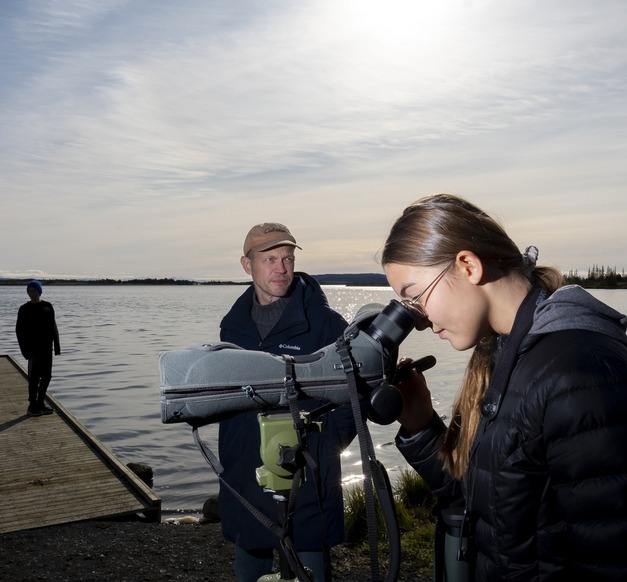
The University of Iceland takes an active role in society with the aim of having a far-reaching impact. This is one of the main focus areas in the University of Iceland's strategy, and calls for diverse contributions from research scientists and faculty. Research and teaching are generally seen as the core activities for academics, however, the social contribution is considerably more diverse.
The example closest at hand are the numerous University projects connected to COVID-19. Those include the famous prediction model of the COVID-19 pandemic, in Iceland; a work group whose task is to evaluate the economic impact of the COVID cirsis with emphasis on industry; the COVID-19 National Resilience Cohort (líðan þjóðar á tímum COVID-19); the participation from the University community in the contagion tracing team, and answers from the Science Web for an enlightened discussion on m COVID-19 (in Icelandic).
"Professional knowledge within the University of Iceland is diverse and it is an important part of our obligations to cultivate and increase this knowledge. It is thus natural to call upon the universities when looking for specialists to work on policy making and to facilitate decision making," says Tómas Grétar Gunnarsson, research scientist and director of the University of Iceland Research Centre in Laugarvatn. He has participated in a variety of projects for the benefit of society in the past few years, alongside his work in the field of biology and natural sciences.
Participation of the University community is important in strategic planning
Tómas Grétar Gunnarsson is currently on the board of the framework programme for categorisation of utilisation options for hydroelectric and geothermal power-plants; where options are prioritised and ordered based on considerations concerning environmental preservation. Furthermore, he serves on a committee on Icelandic strategic planning for biological diversity. Tómas also heads a supervisory committee for a national plan in forestry, and on a three person committee to choose a new director of a government agency.
"I believe that the participation of academics in strategic planning and committees is important for governments, the general public and the University itself. New knowledge acquired by research at the University is communicated both through teaching and directly into the community through various channels. It is important for the public that the authorities have access and make use of diverse professional knowledge when forming policies on important issues and this is where academics can make considerable contributions due to the nature of their work. Working on strategic planning can, furthermore, sometimes support research and teaching with mutual benefits," says Tómas Grétar.
Interest from the community in using the University's assets is completely in line with its strategy where special emphasis is placed on expert knowledge at the University being used in decisions relating to policy making, the competitiveness and prosperity of society.
Tómas Grétar not only contributes to society through research, teaching and strategic planning for the government. He has also led numerous hikes for the University of Iceland and the Icelandic Touring Association called hiking trips with science tips where he talks about and shows participants of all ages the wonders of Icelandic birdlife. IMAGE/Kristinn Ingvarsson.

Diverse projects for the benefit of society
In addition to the aforementioned project for the benefit of society it is worth mentioning that researchers in earth sciences are on the Department of Civil Protection's science council which tackles the danger posed by seismic activities and eruptions. Another community involvement worth mentioning is the participation of specialists from the University of Iceland in a task force drafting a education policy taking cultural diversity among children and young people into consideration.
What is mentioned here above are only a few examples of social involvement, but the University strategy is in line with laws on public universities that encourages them to communicate knowledge to the general public and offer their services to society.
"Our contribution is usually highly appreciated, mostly reflected in that the input of those who participate once is sought again and again," says Tómas Grétar, when asked about how society receives this University service.
"However, it is unavoidable that our input is sometimes at odds with some interests," he adds pensive. "This is notable in environmental sciences, as they are often linked to utilisation of natural resources, where enormous interests are at stake. Then the work sometimes involves big and complex systems which involve considerable uncertainty in measurement and predictions. Examples of these are climate change and loss of biodiversity. Both grave issues that concern everyone and life on this planet for a long time to come," says Tómas Grétar.
"It is common that interested parties and research scientists view things differently here on who should enjoy the benefit of the doubt in such cases. Research scientists should represent the public in such cases, and our main role and duty is to stick to and advocate for the truth. It is then the politicians' job to decide how they use the foundation laid by expert knowledge."


